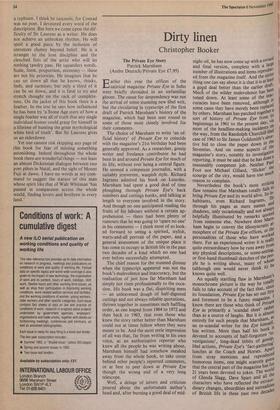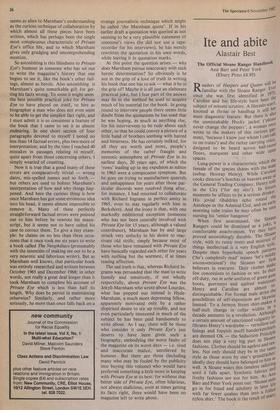Dirty linen
Christopher Booker
The Private Eye Story Patrick Marnham (Andre Deutsch/Private Eye £7.95) arlier this year the offices of the
satirical magazine Private Eye in Soho were briefly shrouded in an unfamiliar gloom. The cause for despondency was not the arrival of some stunning new libel writ, but the circulating in typescript of the first draft of Patrick Marnham's history of the magazine, which had been sent round to some of those most closely involved for their comments.
The choice of Marnham to write 'an of- ficial history' of Private Eye to coincide with the magazine's 21st birthday had been generally approved. As a researcher, gossip writer and freelance contributor he had been in and around Private Eye for much of its life, without ever being a central figure. He seemed a competent journalist, with a suitably irreverent, waspish style. Richard Ingrams admired his book on Lourdes. Marnham had spent a good deal of time ploughing through Private Eye's back numbers and cuttings books, and talking at length to everyone involved in the story. And though no one anticipated reading the fruits of his labours without a certain ap- prehension — there had been plenty of rumours that he was going to 'spare no one' in his comments — I think most of us look- ed forward to seeing a spirited, stylish, warts-and-all portrait of the paper, and a general assessment of the unique place it has come to occupy in British life in the past two decades of a kind which no one had ever before successfully attempted.
The chief reason for the stunned dismay when the typescript appeared was not the book's malevolence and inaccuracy, but the realisation of just how far Marnham had simply not risen professionally to the occa- sion. His book was a flat, dispiriting mess — an unleavened dough of half-digested cuttings and not always reliable quotations, thrown together in sometimes such baffling order, as one leaped from 1964 to 1972 and then back to 1963, that even those who knew the story rather better than Marnham could not at times follow where they were meant to be. And the most eerie impression of all was that, far from writing in his own voice, as an authoritative reporter who knew all the people he was writing about, Marnham himself had somehow sneaked away from the whole book, to take cover behind other people's reported comments, or at best to peer down at Private Eye though the wrong end of a very long telescope.
Well, a deluge of letters and criticism poured about the unfortunate author's head and, after burning a good deal of mid- night oil, he has now come up with a revised and final version, complete with a large number of illustrations and items reproduc ed from the magazine itself. And the nicest thing one can say about it is that it is at least a gopd deal better than the earlier draft' Much of the wilder malevolence has been toned down. At least some of the loaf' curacies have been removed, although ..,411/ some cases they have merely been replace" by others. Marnham has patched together.,a, sort of history of Private Eye from 1." beginnings in 1961 to the present daY, via most of the headline-making incidents 0u the way, from the Randolph Churchill libel case of 1963 to Sir James Goldsmith's ahoy tive bid to close the paper down in Seventies. And on some aspects of the magazine's story, notably its investigative reporting, it must be said that he has done reasonably competent job. Neither Pau Foot nor Michael Gillard, 'Slicker' the scourge of the city, would have too much reason to complain. Nevertheless the book's most striking flaw remains that Marnham totally fails to bring Private Eye and its world alive. Its irit habitants, even Richard Ingrams,
through his pages as mere names an shadows, only occasionally and not always
i helpfully illuminated by remarks quoted from someone else. Nowhere does Marn- ham begin to convey the idiosyncratic ar mosphere of the Private Eye offices, or the personalities of those who have worked there. For an experienced writer it is reallY quite extraordinary how he runs away fr°11/ any physical descriptions, or scene-setting' or first-hand thumbnail sketches of the Peo- ple he is writing about, many of who'll (although one would never think it) he knows quite well. An equally startling flaw in Marnhaill,s monochrome picture is the way he totally fails to take account of the fact that, since its foundation, Private Eye has set out nisi and foremost to be a funny magazine' know there are those who think of Private Eye as primarily a 'scandal sheet' rather than as a source of laughs. But it is almost entirely for such people that Marnham, as an ex-scandal writer for the Eye himself, has written. More than half his book. is devoted to accounts of half-forgotten In- vestigations', long-dead titbits of gossip: libel actions, Private Eye's `fact-gathering lunches at the Coach and Horses. APart
,
from stray mentions and reproduceo humorous items, one might scarcely gu,ess, that the central part of the magazine has ";;:i 21 years been devoted to jokes. The world of Glenda Slagg, Dave Spart and all the characters who have reflected the extracr; dinary changes, absurdities and surrealitie of British life in these past two decades
seems as alien to Marnham's understanding as the curious technique of collaboration by which almost all these pieces have been written, which has perhaps been the single most conspicuous characteristic of Private Eye's office life, and to which Marnham gives only grudging and uncomprehending mention.
So astonishing is this blindness to Private Eye's humour in someone who has set out to write the magazine's history that one begins to see it, like the book's other fail- ings, almost as heroic. Also astonishing is Marnham's quite remarkable gift for get- ting his facts wrong. To some it might seem the best possible practical joke for Private Eye to have played on itself, to hire as biographer a man who does not even seem to be able to get the simplest fact right, and I must admit it is so consistent a feature of the book that I came to see it as almost endearing. In one short section of four paragraphs devoted to myself I noted no less than 14 factual errors, plus two more of interpretation; and by the time I reached 40 mistakes in passages relating to myself, quite apart from those concerning others, I simply wearied of counting.
Now it is true that a good many of these errors are comparatively trivial — wrong dates, mis-spelled names and so forth but others are used to bolster Marnham's interpretation of how and why things hap- pened. And here the curious thing is how once Marnham has got some erroneous idea into his head, it seems almost impossible to remove it. Many of these perfectly straightforward factual errors were pointed out to him before he rewrote his manu- script, but it seems not to have suited his case to correct them. To give a tiny exam- ple: he claims on no less than three occa- sions that it once took me six years to write a book called The Neophiliacs (presumably with the intention of making me out to be a very neurotic and laborious writer). But as Marnham well knows, that particular book was entirely researched and written between October 1965 and December 1968; in other words, not really a great deal longer than it took Marnham to complete his account of Private Eye which is less than half its length. Why does he persist in maintaining otherwise? Similarly, and rather more seriously, he more than once falls back on a strange journalistic technique which might be called 'the Marnham quote'. If in his earlier draft a quotation was queried as not seeming to be a very plausible statement of someone's views (he did not use a tape- recorder for his interviews), he has merely rewritten the quotation in his own words, while leaving it in quotation marks.
At this point the question arises — why does Marnham pursue inaccuracy with such heroic determination? So obviously is he not in the grip of a love of truth in writing his book that one has to ask — what is he in the grip of? Maybe it is all just an elaborate practical joke, but I fear part of the answer may lie in the method he used to acquire much of his material for the book. In going round to interview people there seems little doubt from the quotations he has used that he was hoping, as much as anything else, for his interviewees to be rude about each other, so that he could convey a picture of a little band of brothers seething with hatred and bitterness. He has certainly milked, for all they are worth and more, people's memories of the rather fraught and neurotic atmosphere of Private Eye in its earliest days, 20 years ago, of which the `rows' leading up to my expulsion as editor in 1963 were a conspicuous symptom. But he goes on trying to manufacture quarrels and unhappiness for years after those par- ticular discords were resolved (long after, for instance, 1 had returned to collaborate with Richard Ingrams in perfect amity in 1965, even to stay regularly with him in Berkshire). And the irony is that, with one markedly embittered exception (someone who has not been centrally involved with Private Eye for 15 years, although a valued contributor), Marnham has by and large struck very unlucky in his desire to reac- tivate old strife, simply because most of those who have remained with Private Eye have basically regarded each other for years with nothing but the warmest, if at times teasing affection.
The sad truth is that, whereas Richard In- grams was persuaded that the man to write funnily and sensitively, if not wholly respectfully, about Private Eye was the Jekyll-Marnham who wrote about Lourdes, what has popped out instead is Hyde- Marnham, a much more depressing fellow, apparently motivated only by a rather dispirited desire to stir up trouble, and not even particularly interested in much of the subject he has been paid handsomely to write about. As I say, there will be those who consider it only Private Eye's just deserts to have been given such a biography, embodying the worst faults of the magazine on its worst days — i.e. tired and inaccurate malice, unrelieved by humour. But there are those (including many who may be fooled by the publicity into buying this volume) who would have preferred something a little more in keeping with Private Eye at its best: for without that better side of Private Eye, often hilarious, not always malicious, even at times getting its facts right, there would have been no magazine left to write about.















































 Previous page
Previous page